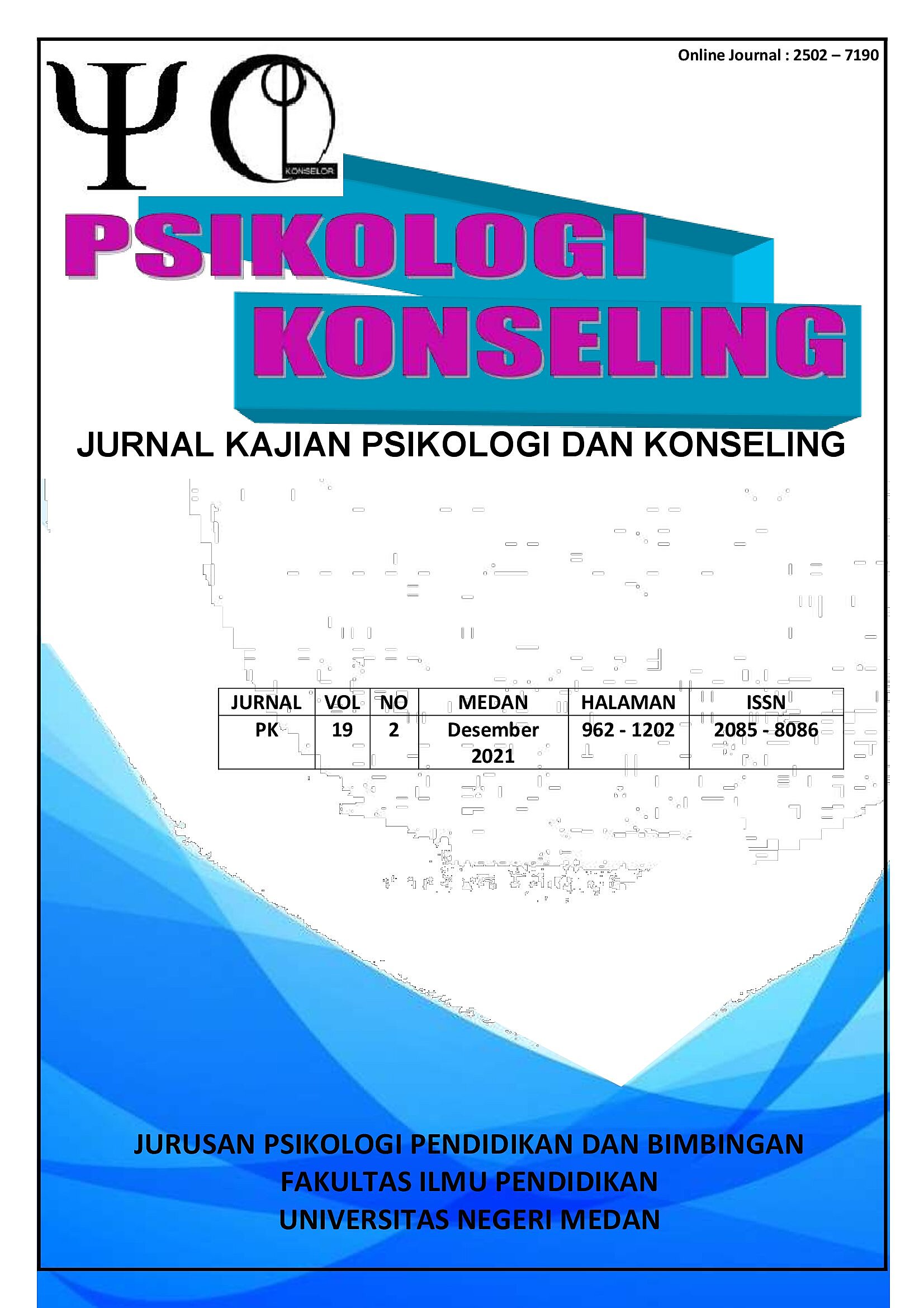MOTIVASI BERPRESTASI SISWA DI SEKOLAH, BAGAIMANA PERAN RELASI GURU DAN SISWA?
DOI:
https://doi.org/10.24114/konseling.v19i2.29301Keywords:
relasi guru-siswa, motivasi berprestasiAbstract
Penelitian ini bertujuan untuk mengetahui hubungan antara relasi guru dan siswa dengan motivasi siswa disekolah, Sampel penelitian sebanyak 300 siswa SMP Negeri 1 Pamekasan yang diambil secara acak dengan rumus slovin dari populasi 992 siswa. Skala pada penelitian ini menggunakan skala motivasi siswa yang disusun sendiri oleh peneliti dan skala relasi guru-siswa yang mengadaptasi dari Pianta (2001). Hasil penelitian menunjukkan bahwa terdapat hubungan positif dan signifikan antara relasi guru dan siswa dengan motivasi berprestasi, hal ini juga berarti semakin tinggi relasi guru dan siswa maka motivasi berprestasi juga akan semakin tinggi. Maka hipotesis penelitian yang menyatakan ada hubungan antara dengan motivasi berprestasi diterima. Relasi siswa yang positif dengan guru dapat menjadi motivator yang kuat dan sangat berarti bagi siswa, selain itu relasi positif guru-siswa menyediakan sumber daya tambahan dan bantuan untuk siswa untuk dapat mengatasi hambatan bagi motivasi berprestasi dan keberhasilan akademis siswa disekolahReferences
Awan, R., Noureen, G., & Naz, A. (2011). A Study of Relationship between Achievement Motivation , Self Concept and Achievement in English and Mathematics at Secondary Level A Study of Relationship between Achievement Motivation , Self Concept and Achievement in English and Mathematics at Seconda. July 2017. https://doi.org/10.5539/ies.v4n3p72
Bakadorova, O., & Raufelder, D. (2016). Do socio-motivational relationships predict achievement motivation in adolescents with high and low school self-concepts? The Journal of Educational Research, 109(3), 219“231.
Best, M., Price, D., & McCallum, F. (2015). Go over there and look at the pictures in the book: An investigation of educational marginalisation, social interactions and achievement motivation in an alternative middle school setting. International Journal of Inclusive Education, 19(4), 422“434. https://doi.org/10.1080/13603116.2014.935815
Boynton, M., & Boynton, C. (2005). The educator™s guide to preventing and solving discipline problems. ASCD.
Brown, K. L. Z. (2005). An examination of the relationship between school culture and student achievement on Ohio Sixth-Grade Proficiency Tests.
DuBrin, A. (2008). Essentials of Management (8E ed.).
Fallu, J. S., & Janosz, M. (2003). The quality of student-teacher relationships at adolescence: A protective factor against school failure. Revue de Psychoéducation, 32(1), 7“29.
Goddard, R. D., Tschannen-Moran, M., & Hoy, W. K. (2001). A multilevel examination of the distribution and effects of teacher trust in students and parents in urban elementary schools. The Elementary School Journal, 102(1), 3“17.
McDermott, P. A., Mordell, M., & Stoltzfus, J. C. (2001). The organization of student performance in American schools: Discipline, motivation, verbal learning, nonverbal learning. Journal of Educational Psychology, 93(1), 65.
McMahon, F.B. and McMahon, J. . (1986). Psychology The Hybrid Science (5th ed.). The Dorsey Press. https://archive.org/details/psychologyhybrid00mcma/page/6.
Merriam-Webster. (1997). Merriam-Webster™s Dictionary.
Nelson, R. M., & Debacker, T. K. (2008). Achievement motivation in adolescents: The role of peer climate and best friends. Journal of Experimental Education, 76(2), 170“189. https://doi.org/10.3200/JEXE.76.2.170-190
Oriahi, C. (2009). Influece of Motivation on Students Academic Achievement (pp. 30“39).
Pintrich, P. R. (2003). A motivational science perspective on the role of student motivation in learning and teaching contexts. Journal of Educational Psychology, 95(4), 667.
Pintrich, P. R., & Schunk, D. H. (2002). Motivation in education: Theory, research, and applications. Prentice Hall.
Roeser, R. W., Urdan, T. C., & Stephens, J. M. (2009). School as a context of student motivation and achievement.
Roorda, D. L., Koomen, H. M. Y., Spilt, J. L., & Oort, F. J. (2011). The influence of affective teacher“student relationships on students™ school engagement and achievement: A meta-analytic approach. Review of Educational Research, 81(4), 493“529.
Schunk, D. H., Meece, J. R., & Pintrich, P. R. (2012). Motivation in education: Theory, research, and applications. Pearson Higher Ed.
Singh, K. (2011). Study of Achievement Motivation in Relation to Academic Achievement of Students. International Journal of Educational Planning & Administration, 1(2), 2249“3093.
Wigfield, A., & Eccles, J. S. (2002). The development of competence beliefs, expectancies for success, and achievement values from childhood through adolescence. In Development of achievement motivation (pp. 91“120). Elsevier.
Wigfield, A., Eccles, J. S., & Rodriguez, D. (2012). Chapter 3 The Development of Children ™ s Motivation in School Contexts. Educational Research, 23(1998), 73“118.
Williams, K., & Williams, C. (2011). Five key ingredients for improving student motivation. Res High Educ J, 12, 1“23.
Downloads
Published
How to Cite
Issue
Section
License
Copyright (c) 2021 Mamang Efendy, Danardana Murwani, Imanuel Hitipeuw, Hetti Rahmawati

This work is licensed under a Creative Commons Attribution-ShareAlike 4.0 International License.
This work is licensed under a Creative Commons Attribution-ShareAlike 4.0 International License.




